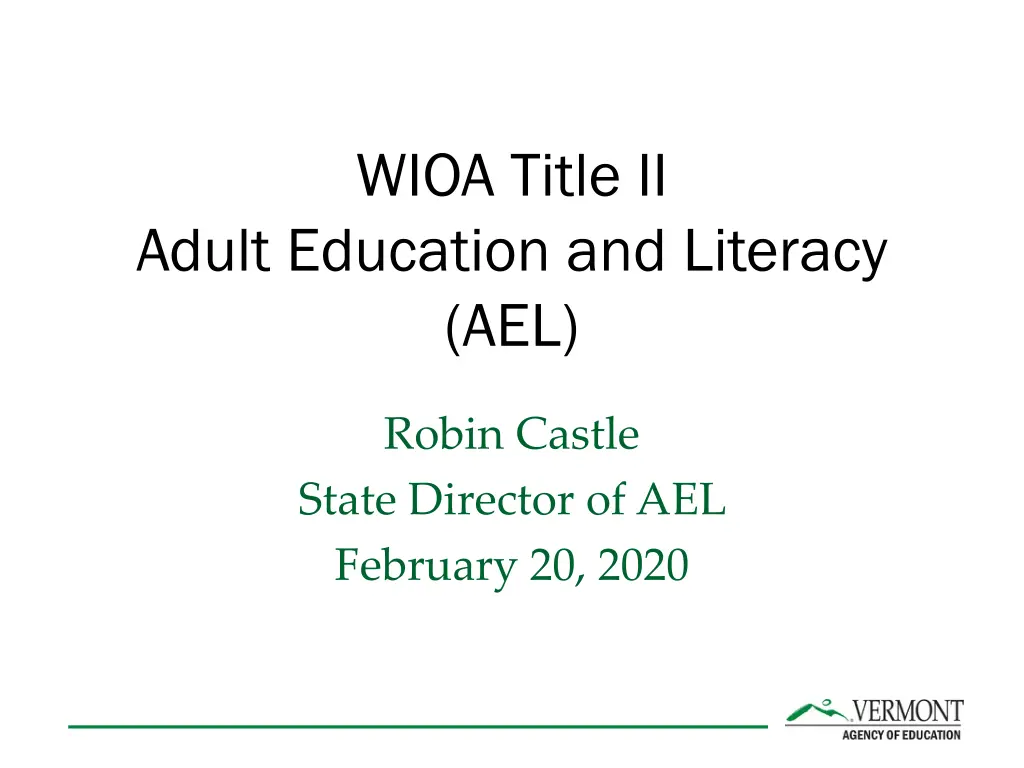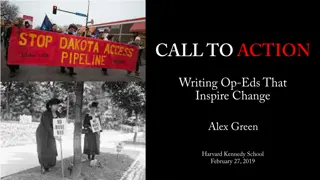
Adult Education and Literacy: Requirements, Eligibility, and Need in Vermont
Explore the world of Adult Education and Literacy, including eligibility criteria, basic skills deficiency, and the significant need for services in Vermont. Discover the importance of programs and activities to enhance skills for employment and education.
Download Presentation

Please find below an Image/Link to download the presentation.
The content on the website is provided AS IS for your information and personal use only. It may not be sold, licensed, or shared on other websites without obtaining consent from the author. If you encounter any issues during the download, it is possible that the publisher has removed the file from their server.
You are allowed to download the files provided on this website for personal or commercial use, subject to the condition that they are used lawfully. All files are the property of their respective owners.
The content on the website is provided AS IS for your information and personal use only. It may not be sold, licensed, or shared on other websites without obtaining consent from the author.
E N D
Presentation Transcript
WIOA Title II Adult Education and Literacy (AEL) Robin Castle State Director of AEL February 20, 2020
Agenda What is Adult Education and Literacy? Who is eligible for services? Definitions Required Title II services in Vermont Required State leadership activities Need for Title II services in Vermont The role of the SWDB in the grant competition
ADULT EDUCATION . . . means academic instruction and education services below the postsecondary level that increase an individual s ability to (A) read, write, and speak in English and perform mathematics or other activities necessary for the attainment of a secondary school diploma or its recognized equivalent; (B) transition to postsecondary education and training; and (C) obtain employment.
Who is Eligible? Who is Eligible? Eligible individual means an individual: who has attained 16 years of age; who is not enrolled or required to be enrolled in secondary school under State law; and who is basic skills deficient; does not have a secondary school diploma or its recognized equivalent, and has not achieved an equivalent level of education; or is an English language learner.
BASIC SKILLS DEFICIENT . . . means, with respect to an individual (A) who is a youth, that the individual has English reading, writing, or computing skills at or below the 8th grade level on a generally accepted standardized test; or (B) who is a youth or adult, that the individual is unable to compute or solve problems, or read, write, or speak English, at a level necessary to function on the job, in the individual s family, or in society.
The Need in Vermont Adult Vermonters with less than a high school education*: 33,883 ages 25 and older (of these, 33% completed less than 9thgrade) 6,480 ages 18-24 40,363 35,567 who speak a language other than English at home Approximately 9,000 speak English less than very well
ADULT EDUCATION AND LITERACY ACTIVITIES . . . means programs, activities, and services that include adult education literacy workplace adult education and literacy activities family literacy activities English language acquisition activities integrated English literacy and civics education workforce preparation activities, or integrated education and training
Required services Required services in Vermont in Vermont Adult education and literacy English language acquisition Workforce preparation activities Integrated education and training (IET) Integrated English Literacy and Civics Education (IEL/CE)
ENGLISH LANGUAGE ACQUISITION PROGRAM . . . means a program of instruction (A) designed to help eligible individuals who are English language learners achieve competence in reading, writing, speaking, and comprehension of the English language; and
ENGLISH LANGUAGE ACQUISITION PROGRAM (cont d) (B) that leads to (i) (I) attainment of a secondary school diploma or its recognized equivalent; and (II) transition to postsecondary education and training; or (ii) employment.
WORKFORCE PREPARATION ACTIVITIES . . . means activities, programs, or services designed to help an individual acquire a combination of basic academic skills critical thinking skills digital literacy skills and
WORKFORCE PREPARATION ACTIVITIES (cont d) self-management skills, including competencies in utilizing resources using information, working with others, understanding systems, and obtaining skills necessary for successful transition into and completion of postsecondary education or training, or employment.
Integrated Education and Training (IET) An IET program includes the following three components: adult education and literacy activities, workforce preparation activities, and workforce training in an in-demand industry.
INTEGRATED ENGLISH LITERACY AND CIVICS EDUCATION (IELCE) . . . means education services provided to English language learners who are adults, including professionals with degrees and credentials in their native countries, that enables such adults to achieve competency in the English language and acquire the basic and more advanced skills needed to function effectively as parents, workers, and citizens in the United States.
INTEGRATED ENGLISH LITERACY AND CIVICS EDUCATION (IELCE) (cont d) Such services shall include instruction in literacy and English language acquisition and instruction on the rights and responsibilities of citizenship and civic participation, and may include workforce training.
IELCE (contd) GOAL. Each program that receives funding under this section shall be designed to (1) prepare adults who are English language learners for, and place such adults in, unsubsidized employment in in-demand industries and occupations that lead to economic self-sufficiency; and (2) integrate with the local workforce development system and its functions to carry out the activities of the program.
IELCE one more time! Funds must be used to provide IELCE in combination with integrated education and training (IET) activities.
Other AEL services Workplace adult education and literacy activities Family literacy activities
State Leadership Activities Align with one-stop partners Operate high-quality professional development programs to improve instruction in AEL Provide technical assistance to AEL providers Monitor and evaluate Disseminate information about proven/promising practices
AEL Grant Cycle and Competition Under WIOA, AEL grant funding must be competed. The last RFP was issued in February 2017 for FY18-FY20 awards. The current RFP is competing funds for two years: July 1, 2020-June 30, 2022.
Rules for Review 463.21 What processes must be in place to determine the extent to which a local application for grants or contracts to provide adult education and literacy services is aligned with a local plan under section 108 of WIOA? (a) An eligible agency must establish, within its grant or contract competition, a process that provides for the submission of all applications for funds under AEFLA to the appropriate Local Boards. (b) The process must include-- (1) Submission of the applications to the appropriate Local Board for its review for consistency with the local plan within the appropriate timeframe; and (2) An opportunity for the local board to make recommendations to the eligible agency to promote alignment with the local plan. (c) The eligible agency [AOE] must consider the results of the review by the Local Board in determining the extent to which the application addresses the required considerations in 463.20.
Two sections that SWDB will review and score Responsiveness to regional needs Alignment with one-stop partners
Timeline FY21-22 Funding Competition February 4, 2020 Funding opportunity and grant application released February 21 Intent to Apply Form due February 28 Applicant Workshop March 25 Proposals due By April 10 orientation for SWDB reviewers held April 24 SWDB reviewers submit recommendations May 1 awards announced July 1 grant period begins
Please note The score ratings of the SWDB are specific to how it sees the application aligning with the State Plan. Other comments are welcome (though not required) to: Help the AOE give feedback to the grant applicants Provide information that can help in developing the grant agreements with each individual grantee.
The Tutorial Center There are four providers and 17+ local learning centers that provide adult education and literacy services in Vermont. Vermont Adult Learning
Questions? Robin.Castle@Vermont.gov (802) 828-0508 State Director of Adult Education and Literacy Vermont Agency of Education






















